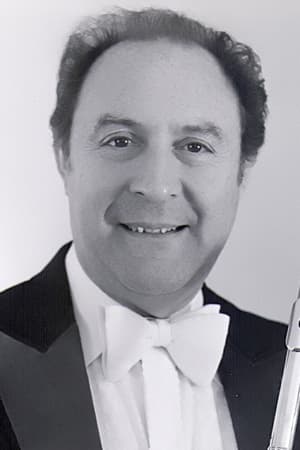Información personal
Conocido por Interpretación
Créditos conocidos 7
Sexo Masculino
Fecha de nacimiento 7 de enero de 1922
Fecha de defunción 20 de mayo de 2000 (78 años)
Lugar de nacimiento Marseille, France
También conocido como
- -
Puntuación del contenido
100
¡Sí! ¡Buena pinta!
Iniciar sesión para informar de un problema
Biografía
Jean-Pierre Louis Rampal (7 January 1922 – 20 May 2000) was a French flautist. He has been personally "credited with returning to the flute the popularity as a solo classical instrument it had not held since the 18th century."
Born in Marseille, the only child of Andrée (née Roggero) and flautist Joseph Rampal, Jean-Pierre Rampal became the first exponent of the solo flute in modern times to establish it on the international concert circuit and to attract acclaim and large audiences comparable to those enjoyed by celebrity singers, pianists, and violinists. Rampal's flair and presence—he was a big man to wield such a slim instrument—paved the way for the next generation of flautist superstars such as James Galway and Emmanuel Pahud.
Rampal was a player in the classical French flute tradition, although behind his technical facility lay the cavalier 'Latin' temperament of the Mediterranean south, rather than the more formal character of the elite north Parisian institutions. His father Joseph was taught by Hennebains, who also taught Rene le Roy and Marcel Moyse. His playing style was characterised by a bright sound and an elegance of phrasing. His natural vibrato varied according to the emotion of the music he played. Rampal was able to breathe in the middle of extended rapid passages without losing the sweep of his rendition. His upper register and wide dynamic range were particularly notable, as was the lightness and crispness of his staccato articulation (his "détaché") heard on his early recordings.
Rampal is best known for popularising the flute in the post–World War II years, recovering a vast number of flute compositions from the Baroque era, and spurring contemporary composers, such as Francis Poulenc, to create new works that have become modern standards in the flautist's repertoire.
Under the tutelage of his father, Rampal began playing the flute at the age of 12. He studied the Altès method at the Conservatoire, where he went on to win first prize in the school's annual flute competition in 1937 at age 16. This was also the year of his first public recital at the Salle Mazenod in Marseille. By then, Rampal was playing second flute alongside his father in the Orchestre des Concerts Classiques de Marseille.
His career in music began without the full encouragement of his parents. Rampal's mother and father encouraged him to become a doctor or surgeon as they felt those professions were more reliable than becoming a professional musician. At the beginning of the Second World War, Rampal duly entered medical school in Marseille, studying there for three years. In 1943, authorities of the Nazi Occupation of France drafted him for forced labour in Germany. To avoid this, he fled to Paris, where it was easier to avoid detection, by frequently changing his lodgings.
While in Paris, Rampal auditioned to study flute at the Paris Conservatoire, where he was taught by Gaston Crunelle from January 1944. Years later, he succeeded Crunelle as flute professor at the Conservatoire. After four months, Rampal's performance of Jolivet's Le chant de Linos won him the coveted first prize in the conservatory's annual flute competition. ...
Source: Article "Jean-Pierre Rampal" from Wikipedia in English, licensed under CC-BY-SA 3.0.
Jean-Pierre Louis Rampal (7 January 1922 – 20 May 2000) was a French flautist. He has been personally "credited with returning to the flute the popularity as a solo classical instrument it had not held since the 18th century."
Born in Marseille, the only child of Andrée (née Roggero) and flautist Joseph Rampal, Jean-Pierre Rampal became the first exponent of the solo flute in modern times to establish it on the international concert circuit and to attract acclaim and large audiences comparable to those enjoyed by celebrity singers, pianists, and violinists. Rampal's flair and presence—he was a big man to wield such a slim instrument—paved the way for the next generation of flautist superstars such as James Galway and Emmanuel Pahud.
Rampal was a player in the classical French flute tradition, although behind his technical facility lay the cavalier 'Latin' temperament of the Mediterranean south, rather than the more formal character of the elite north Parisian institutions. His father Joseph was taught by Hennebains, who also taught Rene le Roy and Marcel Moyse. His playing style was characterised by a bright sound and an elegance of phrasing. His natural vibrato varied according to the emotion of the music he played. Rampal was able to breathe in the middle of extended rapid passages without losing the sweep of his rendition. His upper register and wide dynamic range were particularly notable, as was the lightness and crispness of his staccato articulation (his "détaché") heard on his early recordings.
Rampal is best known for popularising the flute in the post–World War II years, recovering a vast number of flute compositions from the Baroque era, and spurring contemporary composers, such as Francis Poulenc, to create new works that have become modern standards in the flautist's repertoire.
Under the tutelage of his father, Rampal began playing the flute at the age of 12. He studied the Altès method at the Conservatoire, where he went on to win first prize in the school's annual flute competition in 1937 at age 16. This was also the year of his first public recital at the Salle Mazenod in Marseille. By then, Rampal was playing second flute alongside his father in the Orchestre des Concerts Classiques de Marseille.
His career in music began without the full encouragement of his parents. Rampal's mother and father encouraged him to become a doctor or surgeon as they felt those professions were more reliable than becoming a professional musician. At the beginning of the Second World War, Rampal duly entered medical school in Marseille, studying there for three years. In 1943, authorities of the Nazi Occupation of France drafted him for forced labour in Germany. To avoid this, he fled to Paris, where it was easier to avoid detection, by frequently changing his lodgings.
While in Paris, Rampal auditioned to study flute at the Paris Conservatoire, where he was taught by Gaston Crunelle from January 1944. Years later, he succeeded Crunelle as flute professor at the Conservatoire. After four months, Rampal's performance of Jolivet's Le chant de Linos won him the coveted first prize in the conservatory's annual flute competition. ...
Source: Article "Jean-Pierre Rampal" from Wikipedia in English, licensed under CC-BY-SA 3.0.
Interpretación
|
||||||
|
||||||
|
||||||
|
||||||
|
||||||
|






